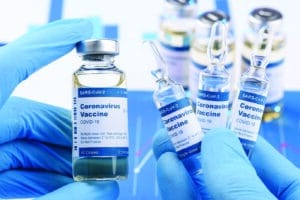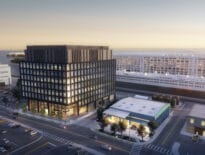Nearly 1.5 million people in Massachusetts are now fully vaccinated against COVID-19 and almost 3 million vaccine doses have been administered here, but a potentially more contagious mutant form of the virus first identified in Brazil is now spreading through the state.
The U.S. Centers for Disease Control counts 58 cases of the P.1 COVID-19 variant, which is thought to be more contagious and able to re-infect those who have already defeated the coronavirus, in Massachusetts — more than any other state in the country.
This weekend, researchers from MIT’s Broad Institute and Harvard released data detailing 54 of the Massachusetts cases of the P.1 variant, which was first identified here in a Barnstable County woman who tested positive for COVID-19 in late February. They found that 43 of the 54 P.1 cases were likely connected to one superspreader event.
“While our understanding of the increased transmissibility of the P.1 variant is still unfolding, the large cluster of identical and nearly identical genomes – a pattern of genetic diversity consistent with superspreading – highlights the ongoing risk of rapid spread of SARS-CoV-2, and in particular for more transmissible lineages,” the researchers wrote. “The extent of community transmission of P.1 in Massachusetts and across the US is currently unknown, however, it is likely that the P.1 variant is already or will soon be circulating in communities and ongoing surveillance will be critical to understanding the trajectory and impact of the P.1 variant.”
The Massachusetts Department of Public Health reported 2,263 new cases of COVID-19 and announced 30 recent COVID-19 deaths on Saturday, raising the state’s total case count to 605,055 and the death toll to 17,281 people. There were 707 people hospitalized with COVID-19 as of Saturday’s update from DPH.
Figures that would have been reported Sunday will be released Monday afternoon, DPH has said. Though there was no reporting of new cases and deaths Sunday, DPH did report that the number of people fully vaccinated in Massachusetts had climbed to 1,478,520 with 3,904,179 total vaccine doses administered.
Massachusetts will also kick off an outreach campaign next week in the 20 highest-risk cities and towns aimed at boosting access to the COVID-19 vaccine and addressing any hesitation among vulnerable populations, officials said Thursday.
A team of 200 bilingual community organizers will hold a total of 83 events across those communities, plus conduct door-to-door canvassing and phone-banking to spread awareness about the availability and value of vaccines.
Combined with grants the Baker administration will direct to local health boards in those cities and towns, officials hope to help drive up vaccination in places where rates still lag and where residents have been particularly hard-hit.
“It’s like a political campaign, except it’s vaccine canvassing,” Health and Human Services Secretary Marylou Sudders said at a Thursday press conference after touring a food bank and then a vaccination site at La Colaborativa in Chelsea.
The community events set to launch next week, part of a plan developed alongside Archipelago Strategies and Health Care for All, involve locally hired organizers in Boston, Brockton, Chelsea, Everett, Fall River, Fitchburg, Framingham, Haverhill, Holyoke, Lawrence, Leominster, Lowell, Lynn, Malden, Methuen, New Bedford, Randolph, Revere, Springfield, and Worcester.
Gov. Charlie Baker said Thursday that his administration will make $4.7 million available to those cities and towns from a pool of $20 million in funding his office pledged to help support them. The so-called “best value grants” will flow directly to the municipalities without a formal application process.
Baker also announced last week that his administration would direct $100 million to Chelsea, Everett, Methuen and Randolph, four hard-hit communities that are in line for disproportionately small batches of federal aid through the American Rescue Plan.
Baker said added resources will “move the needle forward” to reduce vaccine hesitancy in communities of color, also noting that surveys show hesitation among other populations such as white Republican men.
“For a bunch of people, there’s a hesitancy, and it’s different reasons for different people,” Baker said. “The more people you get vaccinated, the more familiar people become with other people who have been vaccinated, the more likely you’ll be to get folks here vaccinated but also to get some of the white populations that are hesitant to get vaccinated.”




 |
| 


